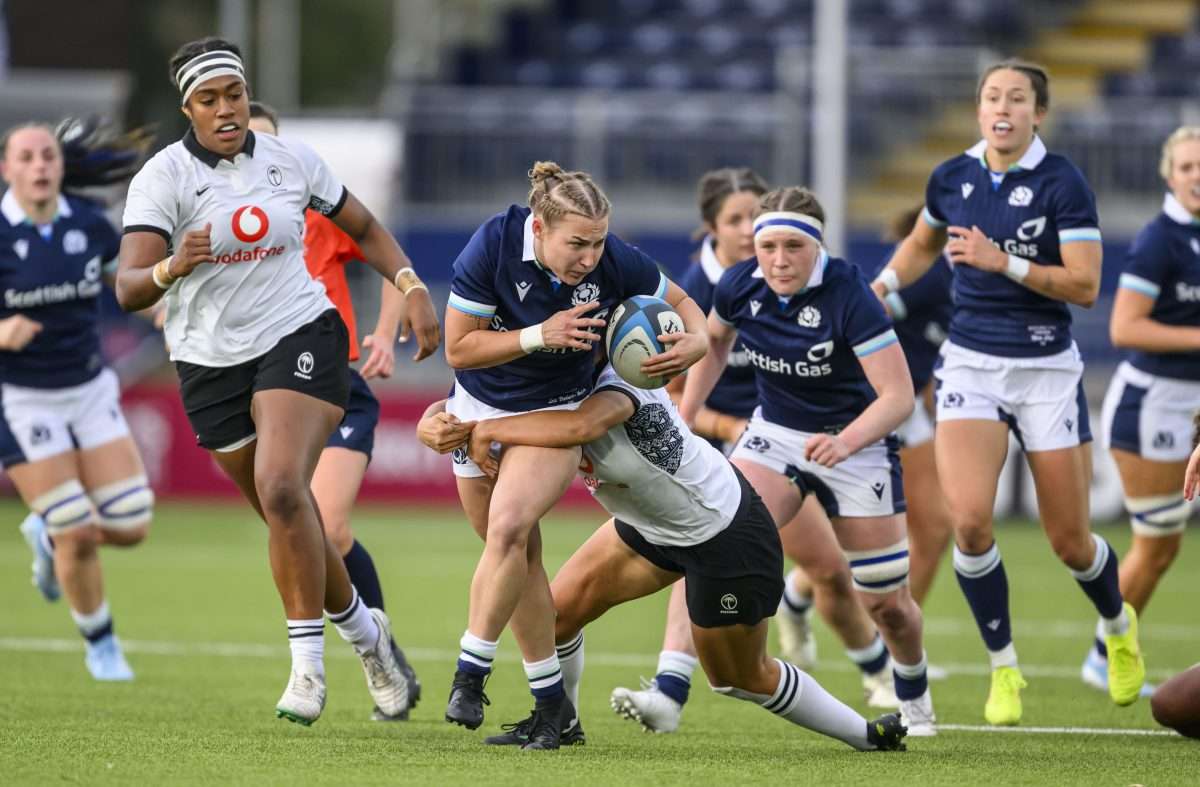WHEN Scotland’s women ran out in Salford Community Stadium last weekend, the roar that greeted them was unlike anything most if not all of this squad had ever experienced before. The opening Pool B win over Wales did more than just put five points on the board: it signalled the arrival of a side whose potential has been simmering for years, waiting for the right moment to break through. Now, as they prepare to face Fiji back at the same venue, the question is (or should be) less about whether Scotland can win, and more about how far this group can go.
This fixture, at first glance, is one of those that neutrals might skip past on the schedule. Scotland, buoyant and well-drilled, taking on Fiji, a team ranked outside the world’s top 10 and still struggling to find consistency at this level. But dig deeper, and the narratives are rich. Scotland’s players know all too well what it feels like to be cast as outsiders, and Fiji’s squad is crammed with raw power, athleticism and flair, that can tilt a game in a heartbeat. For both teams, this contest is a moment of identity: Scotland seeking validation as genuine quarter-final contenders, Fiji determined not to be written off as mere pool-stage participants.
The broader context matters. This Women’s Rugby World Cup is the biggest ever staged, with expanded squads, greater media coverage, and a growing sense that the game is finally being treated with the seriousness it deserves. Scotland arrived in England not just with a team but momentum behind the women’s game at home. The domestic pathways are stronger than ever, crowds are swelling at Hive Stadium in Edinburgh, and younger fans are seeing role models they can touch, cheer, and even emulate. Francesca McGhie’s flying hat-trick against Wales may have made international headlines, but to a ten-year-old girl in Hawick or Aberdeen it means something far more profound: rugby’s doors are open, and the sport is theirs for the taking.
For Fiji, meanwhile, the story is one of resilience. Women’s rugby in the islands remains underfunded and underdeveloped, and yet this team continues to punch above its weight. Their shock victory over South Africa in the last World Cup is still talked about with pride back in Suva, where makeshift pitches and community coaching sessions fuel the pipeline of talent. Here in Manchester, however, Fiji are underdogs again, facing a Scotland side who have trained full-time in the run-up to the tournament. It is a reminder of the uneven playing field in women’s rugby, but also a chance for Fiji to unleash their own brand of chaos against a more structured northern hemisphere opponent.
It is well documented that for Scotland, this tournament holds personal weight with head coach Bryan Easson’s departure confirmed at the end of the campaign. His reign has been one of progress but also of turbulence, with contract disputes and heartbreaking narrow losses often obscuring the steady rise in standards. That the team now finds itself in a position to qualify from the pool stage for the first time in over two decades is a measure of how far they have travelled. For veterans like Helen Nelson and Lana Skeldon, who have ridden every bump along the way, this World Cup is not just another competition – it is the culmination of a journey, and perhaps the beginning of a new one.
The tactical clash with Fiji could hardly be sharper. Scotland’s emphasis is on set-piece solidity, clever kicking, and building pressure phase by phase. Fiji thrive on breaking those patterns, on pulling opponents into an unpredictable contest where offloads stick, lines blur, and defences splinter. One team seeks control … the other: liberation. Rugby rarely gives us clear contrasts of philosophy, but the tension between order and chaos feels baked into this fixture.
And then there is the intangible: confidence. Scotland have it in abundance after dismantling Wales, while Fiji are searching for it after a heavy loss to World number two Canada last week. Confidence can be fragile, though, and World Cups have a way of flipping the script. An early Fijian score, a moment of magic in broken play, could plant seeds of doubt in Scottish minds. Equally, if Scotland seize the initiative early and turn the screw through territory and discipline, Fiji may find themselves chasing shadows.
This game may not be the headline act of the weekend, but for Scotland it is potentially era defining. Win, and the quarter-final doors open wide ahead of a blockbuster final pool match against Canada. Lose, and the ghosts of past disappointments resurface. For Fiji, victory would be historic, perhaps even transformational.
Whatever the outcome, Salford will host more than a pool-stage clash. It will host two teams fighting to shape their futures – Scotland striving for respect and reward after years of graft, and Fiji refusing to be footnotes in someone else’s story.

They may have been outnumbered but Fijiana’s fans made their presence known when they played Scotland in a friendly at Hive Stadium last September. Image: © Craig Watson – www.craigwatson.co.uk
Scotland, placed in Pool B alongside Canada, Wales and Fiji, head into this game as firm favourites for a quarter-final spot. Canada lead the group after thrashing Fiji in their opener, leaving Scotland keen to cement their position.
Fiji, by contrast, arrive in Pool B as underdogs. Their form has been patchy – after a memorable victory over South Africa in the previous World Cup, their build up has been lacklustre, encapsulated by only one win in the WXV3 series and heavy defeats to Spain and Samoa.
Scotland threw down a marker in their Pool B opener, dismantling Wales 38-8. Francesca McGhie starred with a stunning hat-trick – including the tournament’s fastest try just 55 seconds in – supported by scores from Leia Brebner-Holden, Evie Gallagher and Emma Orr, with Helen Nelson slotting four conversions. This emphatic win not only highlighted their attacking potency but also marked Scotland’s biggest World Cup margin since 1994.
Their preparations have been solid: after a narrow 34-29 defeat to Italy in July, Scotland built momentum (despite the defeat) with a spirited showing against Ireland, reinforcing squad depth and resilience. The build-up hasn’t been without turbulence. Head coach Easson will depart post-tournament, and the squad endured uncertainty over contracts pre-tournament – a disruption Scotland must now overcome.
Strategically, Scotland possess strength in their set-piece and precision in the kicking game – key weapons when aiming to control tempo and territory. Against Fiji’s reputed big pack and offloading flair, Scotland’s structured approach may prove decisive.
Fiji are known for their physicality, offloading skills and fearless approach. preparing for a high-stakes World Cup fixture like this will test their structure and composure. While a winning result against Scotland appears improbable, Fiji’s unpredictability means they can’t be written off. Their ability to turn matches on their head with offloads and dynamic play remains a dangerous proposition.
- SET-PIECE VERSUS FREE-FLOW
- Scotland’s lineout, scrum and kicking strategies are built to control games. Fiji’s big front-five and offloading game aim to disrupt that mould. Whoever dominates the breakdown will expect dictate the rhythm of play.
- TEMPO AND TERRITORY
- Scotland’s ability to slow the game, choose when to strike from depth and manage possession will be critical. Fiji’s aim? To turn it into a fast, loose, open contest – forcing Scotland into reactive defence.
- DISCIPLINE AND ACCURACY
- Error rates will matter. Fiji thrive on chaos, Scotland on structure. Handling errors or indiscipline under pressure could swing momentum.
- FRANCESCA MCGHIE (SCOTLAND) – Fresh off a hat-trick, her strike-rate and speed make her a constant threat.
- HELEN NELSON (SCOTLAND) – Her accuracy off the tee keeps scoreboard pressure consistent.
- FIJI’S FORWARD PACK – Relentless at the breakdown, their work will decide whether Fiji can unleash their backs.
Scotland head coach Bryan Easson:
“We’re well aware with this Fiji team that they’ll cause us a lot of threats right across the pitch. We have said that we have to stick to our structure and processes for 80 minutes. They’re a team we’re going to find hard to breakdown, so if we start fast, brilliant.
“Fiji can go from anywhere as you saw from the Canada game [when] they scored a worldie. So we’re well aware of their threats and we’ve spoken long and hard to the back-three around kick threats, the little chips over the top and their ability to offload second to that.”
Scotland hooker Elis Martin:
“There has been a little bit of noise around the type of team we might face, and where we are in the world rankings, but at the end of the day Fiji pose massive threats. They have brilliant, athletic players who are going to offload and throw things at us that we don’t see very often in Six Nations and fixtures like that. We’ve been prepping hard and we’re not in any way complacent going into this game. We know it’s going to be really tough. We’re excited but ready to go.”
Fiji head coach Ioan Cunningham:
“Knowing the Northern Hemisphere style of play where kicking and territory is coached a lot more, that’s something that I’ve tried to develop within this team. Scotland were excellent against Wales. Their 10 and 12 combination works really well, and they moved the ball to width with great cohesion. But their physicality really stood out — they out-muscled Wales in attack and defence. For us, it’s about getting our nuts and bolts right early so we can unleash our offload game.”
Scotland: C Rollie; R Lloyd, E Orr, L Thomson, F McGhie; H Nelson, L Brebner-Holden; L Bartlett, E Martin, E Clarke, E Wassell, S Bonar, R Malcolm (C), R McLachlan, E Gallagher. Replacements: M Wright, A Young, L Cockburn, A Ferrie, E Donaldson, A Stewart, C Mattinson, B Blacklock.
Fiji: L. Vueti, A. Nakoci, V. Ditavutu, M. Stolz, S. Kinita, S. Railumu, L. Senivutu, B. Tawake, V. Matarugu, J. Coates, M. Nakesa, N. Daunimoala, A. Fisher (C), M. Komaitai. Replacements: K. Marawa, K. Naisewa, T. Robanakadavu, C. Yee, S. Waisega, K. Lomani, K. Luvu, A. Nailolo
For Scotland, a win here effectively secures quarter-final qualification and boosts confidence heading into a monumental Pool B finale against Canada. A loss would open the door to a nerve-wracking final round scenario.
Fiji’s path is tougher. To avoid bottoming out the pool, they must spring a surprise. While unlikely, one soaring performance could reshape team morale and legacy.
Expect Scotland to come out firing. A strong set-piece, disciplined game management, and ruthless finishing are likely to see them dominate. Look for scoreboard pressure early, with McGhie and co building a platform, and Nelson supporting with full reliability. However, Fiji may grab moments – snappy offloads, surprise line breaks, or breakdown turnovers. If Scotland drop their focus or discipline, the game could tilt, forcing a stronger northern backline response.
All told, SCOTLAND BY 10 POINTS
